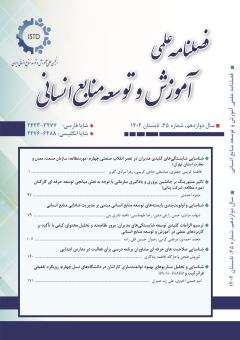تاثیر منتورینگ بر جانشین پروری و یادگیری سازمانی با توجه به نقش میانجی توسعه حرفه ای کارکنان(مورد مطالعه: شرکت پتاس)
محورهای موضوعی : الگوهای تدوین برنامه های توسعه فردی
1 - استادیار،گروه علوم تربیتی، دانشکده روانشناسی و علوم تربیتی، دانشگاه پیام نور، تهران، ایران.
کلید واژه: منتورینگ, توسعه حرفه ای کارکنان, یادگیری سازمانی, جانشین پروری, مجتمع پتاس,
چکیده مقاله :
امروزه سازمانها و به ویژه سازمانهای صنعتی، کلید موفقیت خود را در سرمایه گذاری در منابع انسانی میدانند و توسعه حرفه ای آنها را به عنوان یک راهبرد مهم موفقیت سازمان به حساب می آورند. به همین منظور مدیران از طریق برنامه ریزی برای یادگیریسازمانی زمینه جانشین پروری را از طریق منتورینگ فراهم می کنند. لذا هدف این پژوهش بررسی تاثیر منتورینگ بر جانشین پروری و یادگیری سازمانی با توجه به نقش میانجی توسعه حرفه ای کارکنان مجتمع پتاس است. پژوهش حاضر از نظر رویکرد جزو تحقیقات کمّی، از لحاظ هدف؛ کاربردی و از نظر نحوه گرداوری داده ها و روش انجام آن توصیفی از نوع همبستگی و بر حسب اجراء از نوع پيمایشي می باشد. جامعه آماری شامل کلیه کارکنان مجتمع پتاس(550 نفر) و حجم نمونه با روش تصادفي ساده (226 نفر) می باشد. ابزار پژوهش؛ پرسشنامه منتورینگ کاسترو و همکاران(1993)، پرسشنامه جانشین پروری تابلی و همکاران(1393)، پرسشنامه یادگیری سازمانی نیف (2001) و پرسشنامه توسعه حرفه ای کارکنان لانگ و همکاران (2015) است كه روایی آنها از طریق روایی صوری و محتوایی و پایایی توسط آلفای کرونباخ (منتورینگ، 84/0، جانشین پروری، 90/0، یادگیری سازمانی، 91/0، توسعه حرفه ای کارکنان،89/0) ارزیابی گردید. بهمنظور توصيفيافتهها از آمار توصیفی(جداول و نمودارهاي توزیع فراواني) و آمار استنباطی (مدل معادلات ساختاری با کاربرد نرمافزار Amos به منظور سنجش فرضیات تحقیق) استفاده شده است. نتایج نشان داد منتورینگ بر جانشین پروری(با ضریب 0.67)، توسعه حرفه ای کارکنان(با ضریب 0.63) و بر یادگیری سازمانی(با ضریب 0.52) تاثیر مثبت و معنادار داشته و همچنین؛ تاثیر توسعه حرفه ای کارکنان بر جانشین پروری (با ضریب 0.45) و بر یادگیری سازمانی( با ضریب 0.32) تایید شد. از سوی دیگر، اثر میانجی توسعه حرفه ای کارکنان در رابطه بین منتورینگ و جانشین پروری با ضریب 0.297 و در رابطه بین منتورینگ و یادگیری سازمانی با ضریب 0.279 تایید گردید.
Today, organizations, especially industrial organizations, recognize that investing in human resources is the cornerstone of sustainable success. In this context, managers facilitate succession planning through mentoring and organizational learning. Accordingly, the present study investigated the effect of mentoring on succession planning and organizational learning, with the mediating role of employee professional development in the Potash Complex. The present study was quantitative in terms of approach, an applied in terms of purpose, a descriptive and correlational in terms of data collection and method, and survey research in terms of implementation. The statistical population comprised all 550 employees of the Potash Complex, from which a random sample of 226 participants was selected. The data collection instruments included the Mentoring Questionnaire (Castro et al., 1993), the Succession Planning Questionnaire (Tabli et al., 2014), the Organizational Learning Questionnaire (Neff, 2001), and the Professional Development Questionnaire (Lang et al., 2015). The instruments’ validity was assessed through face and content validation, and their reliability was confirmed using Cronbach’s alpha coefficients (mentoring = 0.84; succession planning = 0.90; organizational learning = 0.91; employee professional development = 0.89). Descriptive statistics (frequency distribution tables and graphs) and inferential statistics (structural equation modeling using Amos software to test research hypotheses) were used to describe the findings. The results showed that mentoring had a positive and significant effect on succession planning (with a coefficient of 0.67), professional development of employees (with a coefficient of 0.63), and on organizational learning (with a coefficient of 0.52). Furthermore, the effect of professional development of employees on succession planning (with a coefficient of 0.45) and on organizational learning (with a coefficient of 0.32) was confirmed. On the other hand, the mediating effect of professional development of employees on the relationship between mentoring and succession planning was also confirmed with a coefficient of 0.297 and in the relationship between mentoring and organizational learning with a coefficient of 0.279.
